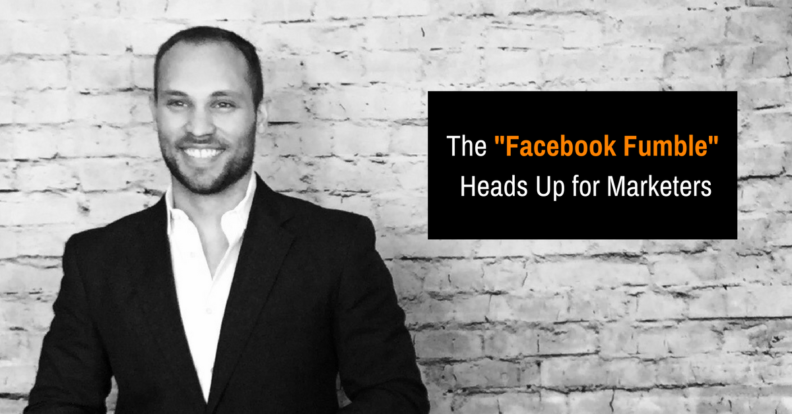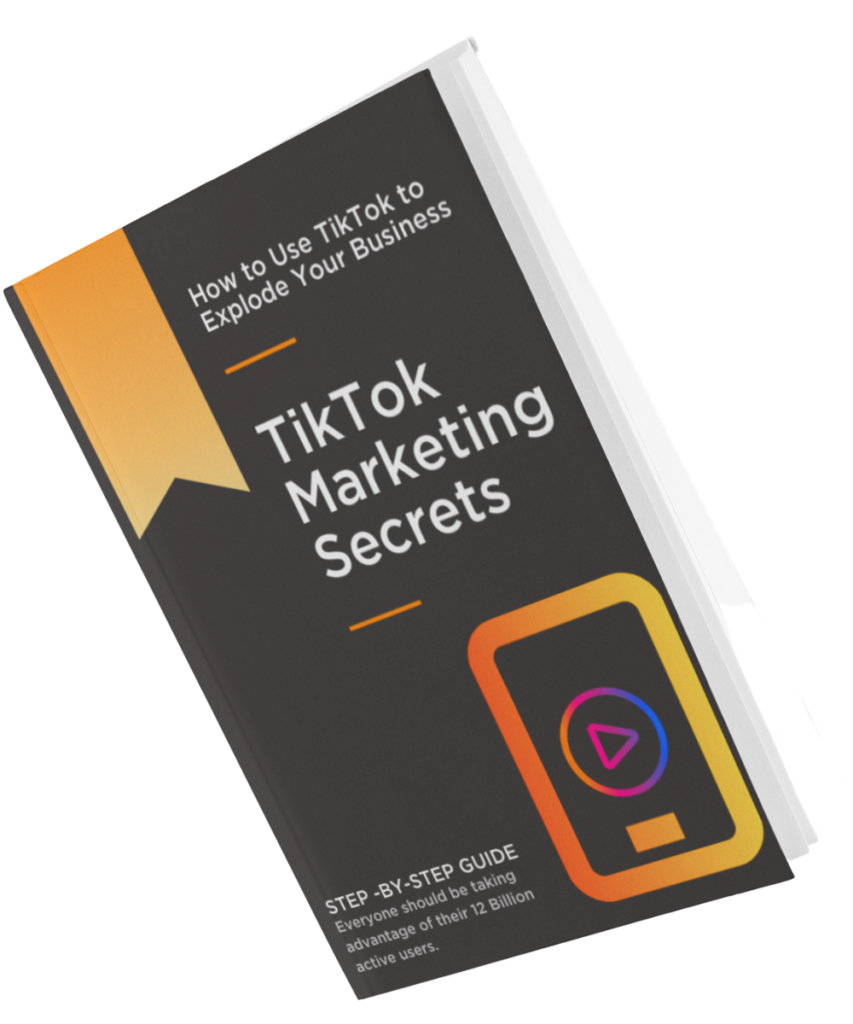It’s been a little over a week since Facebook announced the latest news feed change (Facebook Fumble) intended to surface more content from friends and less content from brands. In that time, it’s clear marketers are setting the groundwork for future news feed changes.
Call me cynical. Marketers are going to screw this up.
Facebook will have no choice. Marketers, never wanting to accept a challenge to simply be better, choose instead to blame Facebook for their unfair treatment. This reaction will ultimately lead to– once again– a poor news feed experience.
The History of News Feed Changes
Marketers have a pretty poor track record when you look back– objectively– at changes that Facebook has had to make over the years. Repeatedly, Facebook needs to beat back something marketers are doing that diminishes the news feed experience.
I encourage you to read through the list of news feed updates Facebook has made since August of 2013. Many of these are in reaction to marketers making the news feed worse.
A few examples:
Jan. 21, 2014: Showing more from friends
Apr. 10, 2014: Cleaning up spam
May 27, 2014: More control over sharing from apps
Aug. 25, 2014: Stop with the click-bait
Nov. 14, 2014: Enough of the overly promotional stuff
Jan. 20, 2015: No more hoaxes
Aug. 4, 2016: Seriously, enough of the click-bait
Dec. 15, 2016: No we mean it about fake news and hoaxes
May 10, 2017: Your links suck
May 17, 2017: Last warning on the click-bait
Aug. 9, 2017: No more cloaking
Aug. 17, 2017: Now click-bait is ruining videos
Dec. 18, 2017: No engagement bait, either
This is just a sampling of news feed updates that needed to be made because of marketers, brands, and publishers who were willing to do whatever it took to get a click. And there is plenty more, especially if you go back before 2013.
Facebook Fumble – “It’s Never the Marketer’s Fault
When Facebook makes these changes to the news feed, the natural response should be to ask …
Why was this change necessary? What mistake am I making?
Instead, it’s always that Facebook is unfairly harming them. Facebook just wants to force brands to pay. Everyone who likes my page wants to see my content– that’s why they liked it in the first place!
Oh, and the big one: What can I do to take advantage of this change?
Ugh …
The reality is that marketers often harm the imbalance of a quality news feed. As a result, Facebook makes changes.
Facebook owes you nothing. You spent years building your business thanks to Facebook.
Facebook owes everything to their users. If people enjoy their experience on Facebook, they come back more often.
Look, the news feed changes aren’t perfect. That’s why they have to make so many of them. And you can debate whether Facebook truly knows what people do and don’t like.
What we do know is that what Facebook does is working. By “working” I mean that after all of these years, it’s still growing and people use it more and more.
If Facebook lets marketers ruin the news feed, that will not benefit your business. Users will enjoy Facebook less.
You should want Facebook to be picky about what they show users.
Ask Yourself …
Let’s not always assume the worst about Facebook’s intentions when these changes are made. Don’t get defensive. Instead, attempt to understand the changes before we judge them.
Let’s ask ourselves some questions (because I love that type of exercise, apparently) …
1. Is click bait good?
You use psychology to make me feel like I need to click something, only to be disappointed in what I ultimately see. No one likes manipulation.
People don’t create click bait. Stop showing me that stuff, please.
2. Is engagement bait good?
Engagement bait was used for one reason: To trick the algorithm into thinking that you’re creating good, quality content. There’s no other purpose for it.
3. Is overly self-promotional content good?
I don’t care if this content comes from a page or from a person. Overly self-promotional content is annoying.
Show me something else.
4. Is all content created inherently good and needs to be seen?
The answer is obvious: No.
This is true of user content, too. Marketers like to talk about how users shouldn’t be forced to see baby pics and cat videos from friends they don’t care about, but the reality is that this stuff is part of the algorithm, too.
The firehose doesn’t work. Expecting users to curate the content they want to see at the levels they want doesn’t work. If you need proof, compare the growth of Facebook to Twitter.
5. Is brand content inauthentic and unnatural?
The answer is a clear and obvious YES. If you don’t see this, you need to take a closer, more honest look.
Is how you’re posting the way a person would post? What’s unnatural?
That’s the kind of stuff that Facebook is trying to get rid of.
Brand Content Isn’t Inherently Bad
Understand that brand content isn’t inherently bad. Marketers often create bad, unnatural, inauthentic, manipulative content. As a result, they’re lumped together.
I can tell you that not all brands will suffer from this. As I scroll my news feed, I still see a ton of brand content. And I fully expect I will continue to see brand content.
Why? The content I see isn’t manipulative trash. It’s useful, entertaining, educational, and natural.
I’m not going to act like this stuff is easy. Creating good content that people want to see when you’re trying to build a business and ultimately sell stuff is hard.
Maybe the News Feed is Better Without You
I’m not saying this to be mean. It’s a business decision that you need to make.
Maybe, just maybe, you’re wasting your time with organic content on Facebook. Frankly, it’s not easy to create good content that people want to read.
Hell, there’s no freaking way I could create good, interesting, engaging content in some industries. Can you make content that will survive the algorithm?
If not, that’s okay. Stop it. There’s no need to keep wasting your time and resources.
Do you get results from ads? Keep your focus there. If not, feel free to find your ship somewhere else.
Don’t You Dare Do That From Your Profile
Good God, I’m already seeing this. Facebook says that people want to see stuff from friends more than they do from brands, so user content is favored. The marketer’s response: Sell crap from their personal profile.
FREAKING STOP THIS MADNESS!
This is a clear and obvious case of marketers thinking they are being wronged. People want to see their content, and dammit, they’re going to make sure these people see it.
Your friends didn’t become your friends on Facebook to see you sell crap (I realize there are exceptions, but hang with me). They became your friends on Facebook for lots of reasons, but almost never is it to get sold stuff.
If your page isn’t getting the traction you want it to get, fix your page. Don’t torture your friends.
And if you think they don’t mind, they’re just being polite.
Please Don’t Ruin Groups
The marketer’s next frontier of things to screw up on Facebook because this update is not their fault is groups. Because group content may now start appearing more often in your news feed (since it features person-to-person conversation).
Expect the inevitable: Pages will start creating groups, followed by a whiny post along the lines of …
” Facebook won’t let me reach you anymore. Join this group instead!”
Really? You think people want to see your brand content so badly that they’ll join a group so that they never miss it? Okay then …
More News Feed Changes Are Coming
I hate to say it, but this is only the beginning. It’s because the actions by marketers are all too predictable.
Marketers will use personal profiles to sell their stuff because they’re convinced that they’re being unfairly punished and their followers desperately want to see their content. They will ruin content from profiles.
We know what Facebook’s going to do next: Make yet another update to the news feed impacting business uses of personal profiles.
Yes, there already is such a restriction in place. That’s mainly regarding having a profile for a “thing” that isn’t a person. You technically can sell stuff and be annoying as a person all day long.
For now, at least…
And we know that brands will create groups, but not for the purpose they were intended. They are supposed to be created to generate natural conversation among people. Marketers, determined to show 100% of their content to 100% of the people, will create groups and spam the heck out of them.
Ultimately, Facebook will need to respond. Group content will take a lower priority.
It’s all coming. It’s so painfully obvious that it’s coming.
I’m Not Immune to This

Look, I’m not completely ignorant. I know where this thing is heading.
One day, my page may not reach anyone organically. If that’s the case, it will likely be my fault.
As more and more people and pages join Facebook, the competition is constantly increasing. The bar you need to pass to reach people keeps rising. What was good enough today may not be good enough tomorrow.
I don’t get insane organic numbers. I also don’t dedicate myself to creating amazing organic Facebook content. I’m admittedly quite boring.
If I begin to lose reach, I’ll have two options: 1. Get better, or 2.
I could whine and complain and kick and cry, but what freaking good is that going to do me??
So, what’s your plan? Please share your thoughts below!






I really like reading through a post that will make people think. Also, many thanks for permitting me to comment! Ophelie Eduino Tara
Having read this I believed it was rather enlightening. Ollie Forys
Real nice style and superb subject material , practically nothing else we want : D. Kevin Ebron
Hello. This article was extremely remarkable, especially since I was searching for thoughts on this matter last Thursday. Allan Brommer
Everything is very open with a clear explanation of the issues. It was really informative. Your website is extremely helpful. Thank you for sharing. Luke Focks
Hi there, just wanted to mention, I enjoyed this blog post. Mohamed Fratercangelo
I was reading some of your posts on this site and I believe this site is very informative! Continue posting. Lemuel Dolman
Touche. Outstanding arguments. Keep up the great spirit. Winford Dickhaut
Hi there, its pleasant post about media print, we all understand media is a impressive source of data. Sal Simpson